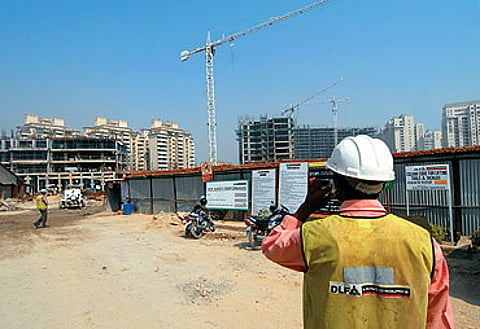The Indian banks are definitely not vulnerable, thanks largely to conservative regulations.
Bimal Jalan, former RBI governor
Atlas Shivered
As the global economic turmoil hits home, triggering trepidation across sectors, <i >Outlook</i> examines exactly where India stands


Given that no one knows the dimensions of the problem, finding a solution to it is even more difficult.
Aseem Dhru, CEO, HDFC Securities

Will we be impacted? Definitely. But will it take us under? Definitely not. We will surely recover.
M.R. Mayya, former BSE executive director

We will go ahead with expansions which have achieved financial closure, put other plans on hold.
Seshagiri Rao, Director-finance, JSW Steel
***
Aviation: Airlines put off expansion plans, some resort to alliances and mull layoffs.
BPOs/ITES: Temporary setback here as US-based clients cut costs, some captive units are closed.
Infrastructure: Increased financing costs impacting projects. Slow growth seen in cement, steel.
Banks/Financial Services: Banks facing cash crunch. Low corporate earnings keep investors away from MFs.
Retail/Consumer Goods: Sagging stockmarkets, high cost of money act as deterrents. Only hope: festive sales.
Automobiles: Increased cost of loans, buyers pulling back purchase plans, likely to affect growth.
***
Investments
- Bank Deposits- Tops the list of concerns, but collapse of any bank highly unlikely. Stay put: while cash is king, keeping it at home is not a good idea.
- Stocks- With high risk and volatility, tough to bet the market bottom. Think long-term; courageous investors should focus on liquid, large-cap stocks.
- Mutual Funds- For equity, think long-term and large-cap funds; conservative investors should look at government securities or fixed maturity plans.
- Gold- Volatile and rising, looks attractive in these uncertain times, but the upside may be limited.
- Housing-Makes sense to wait as prices will fall further; desperate builders are not finding many buyers.
Housing Loans
- Interest rates expected to come down, so wait a while; good time to pre-pay part of the loan if it is not tax-efficient.
Jobs
- Increment- Big impact across the board, expect most companies to be conservative now.
- Hiring- Some sectors will be hit; across the board, employees will take more time, seek to bring costs under control.
- Placements- Too early to say, beginning to become a bit of a question mark.
- Bonuses- Will be hit badly without doubt, particularly for services like consulting, banking and financial services.
Spending
- Prices- Crashing commodity prices should reduce headline inflation over time, for now household essentials remain highly priced
- Diwali- Spending sentiment is subdued, particularly for cars; but other consumer goods companies say Diwali is far from a washout.
- Travel- With dipping business travel, this segment is a major casualty of subdued sentiment.
***

The financial meltdown is feeding into the "real economy" and vice versa. Companies are putting on hold investment plans and cutting costs. Jobs are on the line—"adjustments in workforce" is not something we Indians are really used to—and there’s more to come. Paychecks will not grow as they have in the past, and spending sentiment is already battered by months of inflation. Philosophically, it’s easy to shrug it off: you can’t sustain a party forever. But 9 per cent growth and 7 per cent growth are just numbers. There’s a lot of pain in between. You get hurt in the fall.
***

Yes, there are challenges. Trust, the cornerstone of banking, has been completely shattered worldwide. In India too, banks don’t trust each other, let alone clients and customers. "If we’ve reached our limits on sectors for the quarter, we’re not looking at fresh loans till the next quarter," says a senior banker at a leading public sector bank. Remember, toxic assets and choking of liquidity are two reasons why banks fail. So the fears over inadequate cash to oil the banking system are very real.
There have been several triggers to the liquidity squeeze (see graphic on page 49), and despite unprecedented measures like the 250 basis points cut in the cash reserve ratio in two weeks, bankers remain unsure whether it will mitigate the situation. The pressure is showing: mutual funds are facing redemptions. However, they have also started hiking exit loads and limits on daily redemptions to stem retail exits. For now, the liquidity crisis is real. But it might take up to a month to get the system back to normal. And a month is a long time.
MNC executive, Delhi

He was all set for an upgrade—and then all hell broke loose. Having repaid ahome loan for his second-floor apartment at Charmwood Village in the NCR, Arorawas eyeing a bigger, ground floor house nearby. But when the financial meltdownstruck, the Rs 1.3-crore tag seemed too expensive, and the MNC executivepostponed his plans. "In the current turmoil," he says, "itdidn’t make sense to go ahead. It’s also more expensive to take a loan now.And since the overall environment is fluid, I’m not sure about my personalliquidity or how long I’d be in the present job." Arora’s stock optionshave tanked; the Rs 7 lakh he had put in mutual funds too have been seriouslyaffected. He now prefers to wait for market recovery to square up his losses.The new home can wait too.
Are ICICI depositors safe?
It’s not easy to understand what’s happened with the ICICI Bank stock over the last month. The market has heard it all: the bank’s exposure to Lehman and the global crisis, senior management selling off shares, a bear cartel attack, the bank being on the brink of bankruptcy, a possible takeover, and a bailout package. Result: between September 1 and October 16, the ICICI Bank scrip has crashed by 37.5 per cent to Rs 415. In comparison, the Sensex has slid by 27 per cent while the BSE Bankex has fallen by 16.4 per cent.
Clearly, the rumors have eroded investor and customer confidence. This is despite the bank management, the RBI and the finance minister going all out to reassure customers and stakeholders that all is well (see interview with K.V. Kamath on p 53). It doesn’t help that other bankers see ICICI Bank as paying the price for growing too aggressively too fast, and that the bank has gone through the speculation cycle in the past. In 2003, the bank saw withdrawals from a few branches andATMs in Gujarat after rumors of a liquidity crunch. Warns a banker, "If enough people believe a bank is failing, then that alone is sufficient to squeeze the bank."
A Mumbai-based financial planner, for instance, admits asking clients to move deposits from the bank because his "comfort factor" has disappeared with a bank that has to constantly reiterate its position. ICICI Bank executive director V. Vaidyanathan, however, says the worst has passed. "With all the positive steps taken, we’re seeing an increase in flow of funds back to the bank," says he. The bank says that it is more than meeting regulatory requirements. Analysts stress that information on any bank’s assets—and the securities backing them—is hard to come by, which makes it painful in times like these. What is clear, however, is that the RBI or the government isn’t going to let any bank go under, even if the improbable situation arises.
Meanwhile, there’s also a case for hiking up the depositors’ insurance from the current Rs 1 lakh. Although the government is mulling an increase to Rs 2 lakh, several senior bankers feel that in order to instil confidence, the amount offered to retail investors should be increased to Rs 10lakh.
Businessman, Delhi

All he wanted was a "safe" parking ground for his retirement money. But as the former Wipro executive discovered, investing in equity-linked mutual funds caused more turmoil than he had ever imagined. In a matter of weeks, his Rs 11-lakh portfolio has lost 30 per cent in value; he has also lost money in the stockmarket though he doesn’t say so much. The medical equipment business he runs too is being hit by rising costs. However, despite the losses, Majumdar is determined to stay afloat and fight the downturn. "Now I plan to put my money in real estate in B-class cities where the downturn is not expected to hit so hard," he says. "After all, in India, real estate is the real gold." All he needs are a few years. For the moment, it will be a long wait for those "few years".
How will the credit crunch hit you?
Over the past few months, steps taken to curb inflation have led to a significant rise in interest rates across loan segments. What this means is any loan today is more expensive than it was a year back. Moreover, with all the pressure on consumers’ wallets—thanks to inflation and increasing EMIs and credit card interest rates—customers were beginning to look at revolving credit. The liquidity crisis has put paid to that. Not only has retail credit fallen over the last year, some banks have even put a stop to sanctioning loans against property, unsecured loans and personal loans. It’s tough to say when the tide will turn. On the positive side, the recent measures to infuse liquidity in the system might help individuals as they could lead to a drop in interest rates.
For companies, there’s literally no place to hide. The liquidity crunch is already forcing companies "pregnant with expansion" to curtail or put such plans on the backburner. Seshagiri Rao, director, finance,JSW Steel, says that while the company will "go ahead with expansions that have achieved financial closure, it has put plans that are yet to be financed on hold". Jindal had planned to increase the capacity of its Salem plant by 1 million tonnes, now they will look at it only next year. To add to the crunch, input costs have been rising, affecting those down the supply chain. "Everyone’s postponing large decisions. Those small and medium firms that haven’t diversified will feel it more," says HDFC Bank’s Ashima Bhat.
Software Entrepreneur, Hyderabad

Just one-and-a-half years ago, this IT expert from the US was flying high. He quit his job in an IT company in Hyderabad to start his own project: software that provides comprehensive health services to individuals and corporates. The initial response was good: with IT and BPO offices eager to pamper their employees, a health services package seemed a good idea. No longer. "Everyone’s put the brakes on now," says Malapatti, "and nobody knows how long the downturn will last." But he’s not too worried, having already diversified: he and his wife have set up a bakery-cum-cafe in Hyderabad’s high-end Banjara Hills. The IT expert says he first took up baking because his job was so stressful, but the bakery may help save him from ruin. "Everybody needs to eat," he says.
Are more jobs on the line?
Nothing gets people more scared than the dreaded R word—retrenchment. One only has to look at the shock waves that followed Jet Airways’ announcement that it would lay off 1,900 contractual employees. Reacting to protests galore, an "emotional" Jet Airways chairman Naresh Goyal was quick to reverse his decision. Interestingly, a seniorlabor ministry official says "the law doesn’t say anything about such a situation (retrenchment)". And there are signs there’s more to come.
While the aviation industry is expected to lose $2 bn this financial year, theBPO industry, one of India’s largest recruiters, is also on the backfoot with recruitment down to half of last year. As no one is willing to take risks and expand, growth is down from 40 per cent to 19-20 per cent. The air of disquiet is visible in the dismal manufacturing sector figures for August as well. While many argue about the accuracy of these numbers, it’s a telling indicator that the funds crunch is hitting home in key capital goods sectors. Soon, jobs will be on the line here too, and if the September numbers for manufacturing are negative—as some bankers estimate—that could happen sooner rather than later. And then the negative sentiment could spread to other sectors.
IT entrepreneurs, Hyderabad

"We are screwed," was Krishna Reddy’s first reaction when he heard of the bloodbath on Wall Street. Their software company, Shore Infotech, was set up a year ago with an investment of $3,00,000 solely to provide financial services for companies on Wall Street. Both partners, having worked on Wall Street for nearly 20 years before deciding to move to India, say the intensity and suddenness of the crash has caught them unawares. With close to 100 employees and an office space in Hitech city rented at Rs 2 lakh a month, the two techies say they can hold on for another two to four months. Bleak though the future looks, neither is fazed: Garg says he could become a farmer or open a library. "Suddenly this is an affordable option, because land prices have crashed," says the incurable optimist.
Are the stockmarkets over-reacting?
If you ask a broker to react to the current market situation, he’ll tell you that the light at the end of the tunnel only seems to be from an oncoming train. "Given that no one knows the dimensions of the problem, finding a solution to it is even more difficult. Every time the regulators make announcements to mitigate the situation, we’re all wondering if it’s enough," says Aseem Dhru, CEO, HDFC Securities. The Sensex has lost over 50 per cent in value this year. Despite this staggering number, most market watchers feel it’s par for the course given the level of uncertainty and the extent of systemic issues the global crisis has thrown up.
Some, like former BSE executive director M.R. Mayya feel the extent of reaction is unwarranted given that India is fundamentally sound and the banking system is well regulated. "We need to stop and see the big picture. Are we going to be impacted? Definitely. But is it going to take us under? Definitely not. We will recover," he stresses.SEBI chief C.B. Bhave also emphasises that extremism at both ends of the market spectrum needs to be curbed. "At 20000 levels, the sky is the limit and at 9000-10000, it’s bottomless. The reality lies somewhere in between." Either way, recovery isn’t going to be easy and will take time.
Stock Analyst, Mumbai

Four generations of his family have invested in the stockmarket. But after seeing his net worth slashed by 30 per cent in the past two months, Mathuradas isconvinced we’re seeing something special. "We’ve been hit before, but previously the valuations weren’t this high. This time this fall has come fast and is very painful. Even though I’ve tracked and invested in the market since I was 16, I have no clue how to read the current situation," he says. The one saving grace is that he has never borrowed external money to invest in the market. But why did he withdraw his deposits fromICICI Bank? "It’s not that I’ve lost confidence, I still continue to hold a large percentage of shares in the bank. But withrumors flying around, I’d rather have accessibility to my funds at this stage."
Are real estate prices really falling?

Till a year ago, it was one of India’s most vibrant growth sectors. But in the last few months, that has changed completely.
Tags